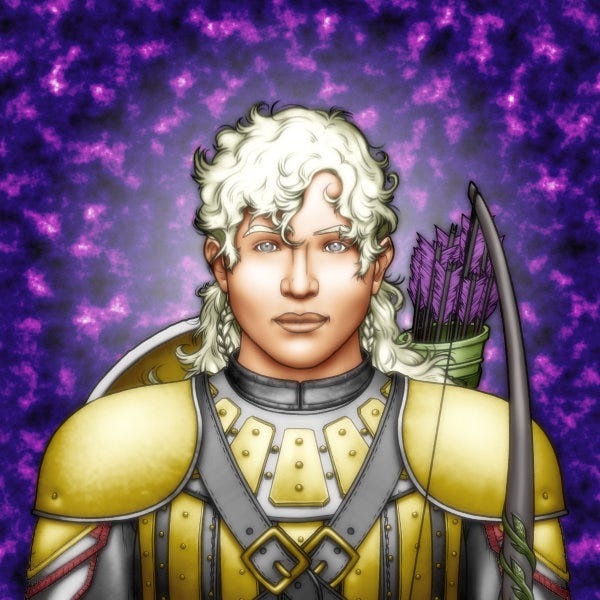Trojan War Wednesday: "Patron of the Mice"
by Apollo, being the 4th installment of RAGE!, a retelling of the Iliad
In the Ancient Greek religion, Apollo held sway over a diverse portfolio of realms. He was the god of music, of prophecy, of healers, of disease, and of the sun. He was the chief archer among the Olympians, along with his twin sister, Artemis.
As an author, I’ve struggled with Apollo’s role in an Olympian story world. With so many areas under his control, it’s been hard to define his core. He is the cause of disease but also inspires treatments and cures. This apparent contradiction only makes sense if Apollo is more generally regarded as a god of health, for good or ill.
Apollo is associated with the sun, taking the place of Helios in some traditions as the driver of the sun-chariot. But in addition to lighting up the physical world, he also allows seers to see into the spiritual realm. These realms combined make Apollo, more generally, a god of vision and insight.
And finally, Apollo is associated with the lyre and the bow, which makes him, more generally, a god of strings.
But having boiled Apollo’s essence down to his being the Greek god of health, vision, and strings, can we bring his role into an even sharper focus?
In the Greek tradition, strings, unspooled, measured, and cut by the Fates, are metaphors for human lives. The realms of health, disease, and medical practice provide Apollo with tools to lengthen or shorten the strings of human life within a range dictated by the Fates, while the realms of prophecy, vision, and diagnosis, allow Apollo to provide mortals with guidance in the care and maintenance of their own individual life-strings.
Take proper care of yourself and the god of strings will pluck a joyful soundtrack to accompany your continued good health. But disregard the advice of your doctor or seer and you may find yourself struck down by an arrow of sickness before your time.
Unfortunately, Apollo resists such simplification.
As an extension of his responsibility for the health of individuals, Apollo also regulated the overall health of a city or nation through the use of plagues, which the Ancient Greeks imagined being transmitted by invisible clouds of pollution called miasma. The pollution of miasma was created and spread by immoral acts, especially those committed by members of the ruling caste. This miasma theory of disease actually persisted from ancient times until relatively recent times. For example, malaria was named in the 18th Century from the Italian for “bad air,” which was then believed to be the disease’s cause.
And when Apollo spreads a plague across the Achaean camp in Homer’s Iliad, he is described as Apollo Smintheus, an epithet from a cult that invoked Apollo as the Patron of the Mice. Is it possible that Homer suspected a miasma could be transmitted by the germs carried by fleas spreading among the rodent population? If so, this prophecy was proven true when improved vision was applied to the field of health by the development of powerful microscopes, which all fits Apollo well.
As the Greek god of strings, pollution, and mice, Apollo will continue to play an important role as the Iliad unfolds.


